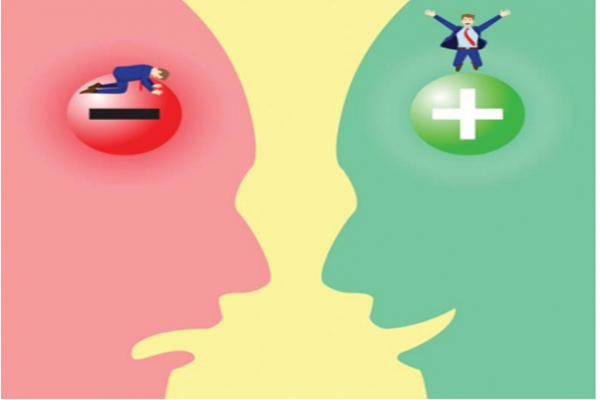The belief that things happen for the best is optimism that relies only on blind faith. In contrast, understanding that we can make the best of things or events that happen is realistic optimism.
Optimism is the extent to which an individual maintains positive expectancies for the future. The way you mentally explain things that happen to you is at the heart of optimism or optimistic mind set. Optimists explain positive life events in terms of personal, permanent causes and negative events in terms of external, temporary causes. Optimism has been conceptualised as both dispositional and an explanatory style. In terms of explanatory style, optimism refers to how an individual thinks about the causality of an event. For instance, consider a situation where a new task is being learned - someone with an optimistic explanatory style will see their success as a result of their own abilities and skills, failure as something beyond their control and a mere temporary glitch in the bigger picture. Positive Psychologist Martin Seligman coined the term learned optimism to explain that people can cultivate more optimism by challenging their negative selftalk. Today, many people strive to be more optimistic in their daily lives.
"Everything happens for the best", is what we are often told or overhear. Tal Ben Shahar, Ph.D., Positive Psychology Expert and Professor, explains this statement based on his experiences in life. According to him, things do not necessarily happen for the best, but some people are able to make the best of things that happen. The belief that things happen for the best is optimism that relies on blind faith. In contrast, understanding that we can make the best of things or events that happen is realistic optimism. Life is unpredictable, and often, unexpected and harsh things happen to us. As great thinkers like Buddha to Schopenhauer have stated - suffering is an inherent part of life, and armed with realistic optimism, we can actively take charge of our predicament, and consequently evolve and grow and make the best of most things that life throws our way. In his book, Thinking Fast and Slow, Nobel Laureate and Economist, Daniel Kahneman, explains that optimists are psychologically resilient and even have stronger immune systems as compared to realists and pessimists. Kahneman's research goes on to say that without optimists we would not have products and companies that have changed our lives for the better
Martin Seligman, on the basis of extensive research, proposed three dimensions of explanatory style, summarised by the three Ps as below:
Pervasiveness - Global/Specific: Whether or not the factors influencing an outcome are seen as event-specific or globally applicable.
Permanence - Stable/Unstable: If the outcome based on factors which are changeable (unstable) or perceived to be temporarily fixed (stable).
Personalisation - Internal/External: Relating to the level of personal control felt by an individual that relates to an outcome.
The virtue of optimism
Optimism is a virtue, and cultural norms and beliefs about good business practices increasingly insist upon looking at the sunny side, and de-emphasising that problematic optimism has been linked to positive psychology, and has been researched in health contexts, and is linked to improved physical and psychological well-being. An investigation into post-transplant patients suggested that the quality of life can be significantly affected by personality characteristics such as optimism. In fact, it was found that an optimistic explanatory style was significantly associated more with higher quality of life than age and gender. A pessimistic explanatory style was found to be associated with self-reporting depressive symptoms.
There are different models that have explored the construct of optimism, and it has been found that optimism is linked to positive affect, and people rated high on optimism are likely to experience more positive emotions. Research shows that on an average, the human being is hardwired to be more optimistic than otherwise. It is an admirable quality that is related to physical and mental well-being. Research has indicated that optimism is a component of Emotional Intelligence, and can be learned, practiced, and acquired.
As opposed to optimists, pessimists focus on obstacles, spend inordinate amount of time worrying, making a list of reasons of why things will not work. Pessimism is unattractive to many and it causes close-mindedness, which shuts down creativity and eventually kills business. Since the human brain is hard-wired to see threats, we shared bad news more readily than we celebrate good news. However, if we act on that news, we are likely to miss opportunities that optimists are finding each and every day.
Optimism and Leadership Success
Martin Seligman, in his landmark book, Learned Optimism (1990), has reported that just about anyone who bears an optimistic world view tends to experience greater success, better health, and longer life. CEOs and leaders who are naturally skilled at optimism, and display these traits are often found to be visionaries who inspire others through their energy and enthusiasm. Martin Seligman also reported that optimistic sales professionals outsell their pessimistic counterparts by 56%. As a result of this study done at MetLife, the insurance giant, changed its hiring practices to include a screening for optimism, which improved retention, and saved tens of millions of dollars to the company.
Optimism needs to be well understood- it is not about denying reality. Optimism often gets a bad rap because people often associate it with a rose-coloured glass ignoring reality. It is rather the ability to remain committed to a vision, in face of adversity, of believing that the team can overcome adversity and yet succeed. Leaders need to be optimistic because execution of a plan never happens without setbacks. When the setbacks occur, it is the optimists who sail through. Another study reported the financial upside of being an optimist - when it comes to money, optimists are more likely to make smarter moves and reap the benefits.
Optimism: a leadership attribute
Optimism is one of the leading attributes of strong leadership. Walt Disney's leadership legacy teaches us that there are many qualities of great leadership, and optimism is certainly one that can make a dramatic and a lasting impact. It was Walt Disney's optimism that helped him overcome one of his first and potentially greatest business challenges. Quoting Walt Disney's life story, Tanveer Naseer, an internationally acclaimed writer and TEDx Speaker, comments that 'optimism stirs within us an infectious belief of a future where we can become that better version of who we can be. ' The Harvard Business Review Article of July 2003, "Delusions of Success: How Optimism undermines executives' decision " underlies the dangers of over optimism in Corporate Planning. Optimism is a virtue, and cultural norms and beliefs about good business practice increasingly stress looking at the sunny side and de emphasising the problematic. Optimism is necessary during times of change and when motivating employees. Optimism without a reality check is dangerous while planning and forecasting.
The author wants the readers to reflect - What role does Optimism play in your Personal Leadership Style? How can Optimism help make you an effective leader?

Has COVID-19 forever changed the way we live and work?
Trending
-
SBI General Insurance Launches Digital Health Campaign
-
CredR Rolls Out 'Life Happens' Leave For Its Employees
-
Meesho Announces 30-Week Gender-Neutral Parental Leave Policy
-
Microsoft Unveils Tech Resilience Curriculum To Foster An Inclusive Future
-
60% Indian Professionals Looking For Job Change Due To COVID: Survey
-
SpringPeople And Siemens Collaborate For Digital Transformation Push
-
86% Professionals Believe Hybrid Work Is Essential For Work Life Balance: Report
-
Almost 1 In Every 3 People's Personal Life Affected Due To Work Stress
-
Meesho Rolls Out Reset And Recharge Policy For Employees
-
80% Of Talent Leaders & Academics Say Pandemic Changed Skill Needs For Youth: Report
-
Hero Electric Rolls Out 'Hero Care' Program For Employees
-
Human Capital In Collaboration With ASSOCHAM Hosts Virtual Conference
-
IKEA India, Tata STRIVE Collaborate To Create Employability And Entrepreneurship Opportunities
-
SAP India, Microsoft Launch Tech Skilling Program for Young Women
-
DXC Technology, NASSCOM Collaborate For Employability Skills Program
-
Lenskart To Hire Over 2000 Employees Across India By 2022
-
Mindtree Launches Learn-and-Earn Program
-
Tata AIA Extends 'Raksha Ka Teeka' To Its Employees
-
Swadesh Behera Is The New CPO Of Titan
-
NetConnect Global Plans To Recruit 5000 Tech Professionals In India
-
Hubhopper Plans To Hire 60% Of Indian Podcasters By 2022
-
Corporate India Needs More Women In Leadership Roles: Report
-
Aon to Invest $30 Million and Create 10,000 Apprenticeships by 2030
-
Tech Mahindra Launches ‘Gift a Career’ Initiative for Upskilling of Youth
-
40% Women Prefer Flexible Working Options in Post-COVID World: Survey
-
3 out of 4 companies believe they can effectively hire employees virtually: Report
-
Vodafone , CGI and NASSCOM Foundation launch digital skills platform
-
Odisha: Bank, postal employees to deliver cash for elderly, differently-abled persons
-
Skill India launches AI-based digital platform for "Skilled Workforce"
-
Hiring activity declines 6.73% in first quarter: Survey
-
70% startups impacted by COVID-19 pandemic
-
Bajaj Allianz Life ropes in Santanu Banerjee as CHRO
-
Over 70 Percent MSMEs look at cutting jobs to sustain businesses
-
93 Per Cent employees stressed about returning to office post-lockdown
-
Johnson & Johnson India announces family benefits for same gender partners
-
Indian firms turning friendly towards working mothers
-
Welspun India names Rajendra Mehta as new CHRO
-
Wipro partners with NASSCOM to launch Future Skills platform



Human Capital is niche media organisation for HR and Corporate. Our aim is to create an outstanding user experience for all our clients, readers, employers and employees through inspiring, industry-leading content pieces in the form of case studies, analysis, expert reports, authored articles and blogs. We cover topics such as talent acquisition, learning and development, diversity and inclusion, leadership, compensation, recruitment and many more.
Subscribe Now










































Comment